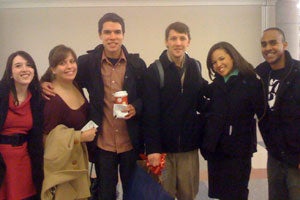Six HLS students in the Title IX clinical course of Diane L. Rosenfeld spent two days recently at the University of Richmond conducting a training session for more than 50 undergraduate student leaders on issues of sexual respect, rape, consent, and related matters.
The university asked Rosenfeld, an HLS lecturer on law and a national expert in gender issues including violence against women, to create a training program in response to an incident last Fall in which a fraternity rush chairman emailed prospective members with a sexually explicit and misogynistic message. The university is already planning to use the program again in required training for fraternity and sorority pledges, and Rosenfeld hopes to see it used on other campuses, too.
Rosenfeld traveled to Richmond to interview 40 people about the fraternity incident. When she returned, her students spent three weeks putting together training materials for a peer-to-peer initiative. Their audience in the two-day training included student leaders from various campus organizations including sororities and fraternities. The training included clips from documentaries, film, and television programs highlighting pop culture attitudes towards women, masculinity, and sexual assault, in order to prompt conversation about sexual respect. HLS students selected the sources, including Mad Men, American Pie, Super Bad, and Gossip Girl.
“They put together a fantastic presentation that got everyone talking,” said Rosenfeld, who believes the college students were more responsive to the law students than they would be to older adults. “They’re only out of college a year or two, so they’re much more connected to the culture,” she said.
The students broke into smaller groups after the presentations, Rosenfeld said, and had “very open-heart discussions about consent, sex, culture, respect, self-esteem and Title Nine, and why we all have right to be thriving at our universities instead of being subjected to sexual assault.” One of the topics was “theme” parties popular on college campuses, including “pimp and ho” parties and “predator and prey” parties. “There were some uncomfortable frat members there,” said Rosenfeld. “The women have had these conversations more but they also were kind of surprised when they stopped and thought about their own behavior and how to challenge it.”
The training also included Rosenfeld’s 2002 documentary, “Rape Is …,” produced by Oscar-winning filmmakers Margaret Lazarus and Wenner Wunderlich of Cambridge Documentary Films, which addresses various forms of rape and their effects on victims. “That was really intense, but what we really wanted to say was … that one act of unwanted sex can ruin someone’s life forever,” said Rosenfeld.
The University of Richmond will use the HLS materials in a training session this January that will be required for all incoming pledges of sororities and fraternities. “Our goal was to hand off these training tools so that people can intervene when they see misogynist, racist, discriminatory behavior,” Rosenfeld said, and to “get them to rethink their own behavior, giving them the confidence to stand up against the social tide when it’s hard to do.”
The HLS clinical students who conducted the peer-to-peer training are Tony Balkissoon ’10, Laura Jarrett ’10, Brienne Letourneau ’10, Dan Routh ’09, Grayson Walker ’10, and Stefani Johnson ’09. Another student, Caitlin Vogus ’10, assisted in preparing the materials but did not go to Richmond.
“I felt like it was important because we had the opportunity to really make an impact on a group of young people and hopefully make changes in the way they think about issues of sexual respect,” said Johnson. “We talked about leading by example, and how culture would change if younger people didn’t arrive at college and see organization leaders or sports teams making degrading comments about women or taking advantage of highly intoxicated women.”
Johnson said the exercise was a “fascinating” educational experience. “It made me feel like I could really make impact as law student on our culture,” she said.
